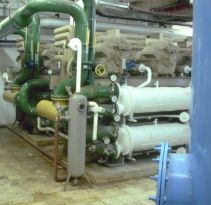CQM
applications
Air-conditioning
The air-conditioning market is one of the biggest target markets
for the C.Q.M. machines. Applications are mostly with central air-conditioning
units, like in hospitals, banks, hotels, office buildings etc.
A specific advantage of this market is that all air-conditioners and coolers work
identically. Therefor power saving calculations appear throughout each and every
manufacturer's literature and one can calculate the pay-back time very accurately.
Energy savings of 15 - 30 % are very common in this market.
Power Stations
Ball cleaning systems are widely used in this application for
many years.
Biggest advantages of the C.Q.M. system are the competitive price level and the
fact that the balls return to the injector by means of the system pressure. In
other systems one uses a separate pump, which gives a lot of wear and damage to
the cleaning balls.
Cooling systems
Used in plants for the production of dairy products and ice-cream,
in meat processing plants and in cold-storage plants. Due to their nature, these
systems usually work around the clock, 365 days a year. They differ from each
other as to the cooling matter flowing therein: ammoniac or Freon.
Cooling systems are susceptible to problems involving down-time for purposes of
prolonged treatment and cleaning of heat exchangers, thus the system is stopped
and causes detoriation in the production process.
Refineries / Chemical industry
Here a large number of heat exchanger processes require regular
cleaning. This is done at present by means of hand cleaning and requires stoppage
of the heat exchanging system.
Pharmaceutical Industry
These production processes require a constant temperature. Due
to the contamination of heat exchangers, there is a reduction in output and changes
in temperature. The temperature differential over the walls becomes higher and
the media can be locally overheated. The results in a worse product quality.
Textile industry
These plants are highly affected due to the dirt in the water
towers caused by the production process. This blocks the heat exchangers.
Plastics industry
Their problem lies in small heat exchangers and small diameter
inner piping which absolutely prevent mechanical cleaning. This often involves
rinsing with acid, whereby heat exchangers are often damaged.
Ships
Given the presence of algae and micro-organisms in the sea water,
which is often used for cooling, these are liable to cause problems so that the
heat exchangers lose their excellence of operation.
New ships carry only small crews, thus there is no available personnel to deal
with the high frequency treatment required by heat exchangers. Furthermore a ship's
down-time costs thousands of dollars a day.
